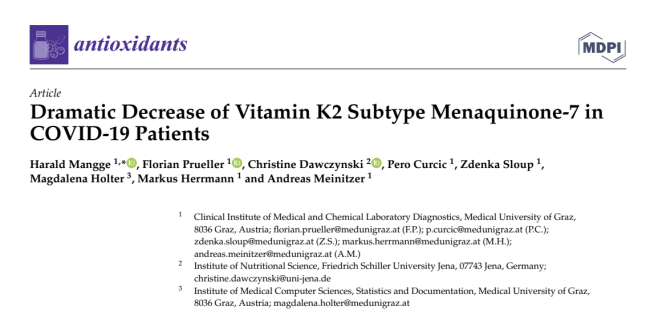预约演示
更新于:2025-05-07
MGP
更新于:2025-05-07
基本信息
别名 Cell growth-inhibiting gene 36 protein、matrix Gla protein、MGLAP + [1] |
简介 Associates with the organic matrix of bone and cartilage. Thought to act as an inhibitor of bone formation. |
关联
1
项与 MGP 相关的药物CN118206648
专利挖掘靶点 |
作用机制- |
在研机构 |
原研机构 |
在研适应症 |
非在研适应症- |
最高研发阶段药物发现 |
首次获批国家/地区- |
首次获批日期1800-01-20 |
100 项与 MGP 相关的临床结果
登录后查看更多信息
100 项与 MGP 相关的转化医学
登录后查看更多信息
0 项与 MGP 相关的专利(医药)
登录后查看更多信息
1,272
项与 MGP 相关的文献(医药)2025-05-01·Acta Physiologica
Vitamin K preserves gamma‐glutamyl carboxylase activity against carbamylations in uremia: Implications for vascular calcification and adjunct therapies
Article
作者: Gombert, Alexander ; Kramann, Rafael ; Grommes, Jochen ; Floege, Jürgen ; Kaushik, Suresh ; de la Puente‐Secades, Sofia ; Jankowski, Vera ; Ziegler, Susanne ; Kaesler, Nadine ; Kuppe, Christoph ; Roma, Leticia Prates ; Frisch, Janina ; Jankowski, Joachim
2025-05-01·Clinica Chimica Acta
Vascular calcification inhibitors in chronic kidney disease
Review
作者: Viigimaa, Margus ; Leis, Liisi ; Adoberg, Annika ; Fridolin, Ivo ; Holmar, Jana ; Uhlin, Fredrik ; Luman, Merike
2025-04-01·Molecular Therapy
Dysregulation of astrocyte-derived matrix gla protein impairs dendritic spine development in pyridoxine-dependent epilepsy
Article
作者: Liang, Ziqi ; Guo, Weixiang ; Wu, Junjie ; Wang, Min ; Guo, Ye ; Liu, Qiang ; Qin, Dezhe
1
项与 MGP 相关的新闻(医药)2023-01-17
·生物谷
最近一段时间,新冠病毒来势汹汹,不少人已经感受过了来自它的“攻击”,发烧、咽痛、咳嗽、肌肉酸疼、浑身无力、味觉嗅觉丧失……而研究发现:新冠感染还会引
最近一段时间,新冠病毒来势汹汹,不少人已经感受过了来自它的“攻击”,发烧、咽痛、咳嗽、肌肉酸疼、浑身无力、味觉嗅觉丧失……而研究发现:新冠感染还会引起骨吸收细胞的炎症激活,从而在感染期和康复期导致严重的骨质流失,新冠肺炎患者的维生素K2(MK-7)水平也会显著降低。
(奥地利和德国科学家Mangge等在《抗氧化剂》(antioxidants)杂志上发表“新冠肺炎患者维生素K2(MK-7)水平显著降低”)
骨质流失会招来骨质疏松症这个“沉默的杀手”,从而增加骨折的危险性。生活中可能有人认为,骨质疏松症是老年人的专利,距离还很遥远,因此并不是很重视。实际上,骨质疏松症已经越来越年轻化,而且由于儿童和青少年时期是骨骼成长的重要阶段,大约有50%的骨量是在青春期累积的,当骨量积累到一定峰值之后就会慢慢进入减少期。因此,阳康后,不论是老人、中年人还是青少年以及儿童都应注意预防骨质流失。
想要预防骨质疏松,先要打好营养基础,日常生活中要注意合理膳食。多吃富含钙的食物,如牛奶、奶酪、豆制品、鱼虾贝类,绿叶蔬菜、芝麻酱等。同时还要多摄入维生素A、C、D、K, 这些都会影响骨量维持,其中维生素K至关重要。
事实上,我们的骨骼和牙齿主要是由钙构成,它对保持骨骼的强壮和健康至关重要。当人体缺钙的时候,骨骼就像溶洞一样千疮百孔,就容易引起骨质疏松,“补钙”也就成为防治骨质疏松的必要手段,维生素K2则是补钙入骨的关键。
维生素K2是一种脂溶性维生素,能够激活基质谷氨酸蛋白(MGP)和骨钙素蛋白(OC),从而将血液中钙离子精准输送至骨骼,形成“骨钙”,实现“促钙成骨”①。但维生素K2的来源相对较少,仅来源于动物内脏、蛋黄、动物油脂、发酵食物,有时候并不能满足身体所需。因此在选择钙制剂时,可选择含有维生素D以及维生素K2的产品。其中4-17岁的儿童、青少年建议选择妈咪爱钙维KD咀嚼片,其含有碳酸钙、维生素K2和维生素D3,三效合一,使钙真正补进骨骼中。
在品质方面,妈咪爱钙维KD咀嚼片源自韩国领先药企韩美集团,并且还是蓝帽子保健食品(食健G202134000086),功效、安全均有保障。
除了以上方法,也要避免食盐摄入过量、吸烟、酗酒等不良生活习惯,加强体育锻炼,保证充足的睡眠,多管齐下,才能更好的防治骨质疏松、骨量流失。
参考资料
①陈淑玲,赵瑾珠,郝燕.维生素K与儿童骨健康的研究进展[J].中国儿童保健杂志,2021,29(07):742-745.
陈杰鹏《维生素K2(MK-7)——科学、产业生态和未来》演讲。

CSCO会议
分析
对领域进行一次全面的分析。
登录
或

生物医药百科问答
全新生物医药AI Agent 覆盖科研全链路,让突破性发现快人一步
立即开始免费试用!
智慧芽新药情报库是智慧芽专为生命科学人士构建的基于AI的创新药情报平台,助您全方位提升您的研发与决策效率。
立即开始数据试用!
智慧芽新药库数据也通过智慧芽数据服务平台,以API或者数据包形式对外开放,助您更加充分利用智慧芽新药情报信息。
生物序列数据库
生物药研发创新
免费使用
化学结构数据库
小分子化药研发创新
免费使用